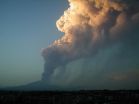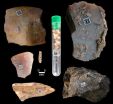(Press-News.org) An International research team has discovered that seasonal temperatures in Europe, above all in winter, have been affected over the past 500 years by natural factors such as volcanic eruptions and solar activity, and by human activities such as the emission of greenhouse gases. The study, with Spanish involvement, could help us to better understand the dynamics of climate change.
Up until now, it was thought that Europe's climate prior to 1900 was barely affected by external factors, but now a group of scientists has shown that natural phenomena such as volcanic eruptions or solar radiation, as well as human emissions of aerosols and greenhouse gases, have had an impact on the evolution of Europe's climate over the past five centuries.
"The influence of the increase in levels of greenhouse gases, in particular, can be clearly seen since the end of the 17th Century", Jesús Fidel González Rouco, a physicist at the Complutense University of Madrid and co-author of the study, which has recently been published online in the journal Nature Geoscience, tells SINC.
The researchers studied how natural and human factors affected temperatures across Europe throughout the seasons in the years from 1500 to 2000. The results show that winter is the season in which changes in levels of greenhouse gases and aerosols from manmade sources can be seen to have the clearest influence.
As reliable temperature records do not go back any further than 150 years, the team carried out simulations using three climate models and reconstructed past climate scenarios based on old instrumental observations, information recorded in historical documents and by studying tree rings.
Lessons for climate change
"For the first time we are able to attribute causes to how the climate has evolved over several centuries, working at continental and seasonal scale", says González Rouco. "And the relevance of this approach is based on the fact that the impact of any possible climate change can be greater for societies and ecosystems within the range of these spatial and time-based scales".
Scientists say that Europe's climate "has in the past been sensitive to variations in radiative forcing from natural and human sources (changes in the energy received from the Sun, in volcanic activity, or in levels of greenhouse gases), so it is to be expected that the intense current and future variations in these forcings will play a significant role in the future evolution of Europe's climate".
INFORMATION:
This study was led by the University of Edinburgh (United Kingdom) with the participation of the Complutense University, the Justus-Liebig University (Giessen, Germany) and the University of Berne (Switzerland).
References:
Gabriele Hegerl, Juerg Luterbacher, Fidel González-Rouco, Simon F. B. Tett, Thomas Crowley y Elena Xoplaki. "Influence of human and natural forcing on European seasonal temperaturas". Nature Geoscience, 16 de enero de 2011 (avance on line). DOI: 10.1038/NGEO1057.
Man, volcanoes and the sun have influenced Europe's climate over recent centuries
2011-01-20
ELSE PRESS RELEASES FROM THIS DATE:
Unfolding pathogenesis in Parkinson's
2011-01-20
The study, published in the Journal of Clinical Investigation, reveals that damaged alpha-synuclein proteins (which are implicated in Parkinson's disease) can spread in a 'prion-like' manner, an infection model previously described for diseases such as BSE (mad cow disease).
"This is a significant step forward in our understanding of the potential role of cell-to-cell transfer of alpha-synuclein in Parkinson's disease pathogenesis and we are very excited about the findings", says Professor Patrik Brundin at Lund University, Sweden, who led a team of investigators from ...
Neiker-Tecnalia makes progress in detection and prevention of infection by visna maedi virus
2011-01-20
Researchers at Neiker-Tecnalia (the Basque Institute for Agricultural Research and Development) have undertaken a study on the epidemiology and diagnosis of infection by visna/maedi virus. This is a virus that affects sheep herds causing chronic interstitial pneumonia, mastitis and neurological disorders. The study confirmed that horizontal transmission (direct contact between infected animals) of the virus is the most likely path of infection, rather than vertical transmission (from infected suckling milk or colostrum). Since there is no current effective treatment against ...
Data matrix codes used to catalogue archaeological heritage
2011-01-20
The research team at the Centre for the Studies of Archaeological and Prehistoric Heritage (CEPAP) of Universitat Autònoma de Barcelona (UAB) have implemented an innovative system to register archaeological artefacts which eliminates problems in manual markings, such as errors in writing or erosion of data. The system, based on direct labelling using bi-dimensional data matrix (DM) codes, has been used by the CEPAP team during two years, in which numerous artefacts and bone remains from sites in Spain and Africa were registered.
The marking of archaeological material, ...
Challenging the limits of learning
2011-01-20
Tel Aviv -- Although we're convinced that baby is brilliant when she mutters her first words, cognitive scientists have been conducting a decades-long debate about whether or not human beings actually "learn" language.
Most theoretical linguists, including the noted researcher Noam Chomsky, argue that people have little more than a "language organ" -- an inherent capacity for language that's activated during early childhood. On the other hand, researchers like Dr. Roni Katzir of Tel Aviv University's Department of Linguistics insist that what humans can actually learn ...
Better learning through handwriting
2011-01-20
Associate professor Anne Mangen at the University of Stavanger's Reading Centre asks if something is lost in switching from book to computer screen, and from pen to keyboard.
The process of reading and writing involves a number of senses, she explains. When writing by hand, our brain receives feedback from our motor actions, together with the sensation of touching a pencil and paper. These kinds of feedback is significantly different from those we receive when touching and typing on a keyboard.
Learning by doing
Together with neurophysiologist Jean-Luc Velay at the ...
Malignant brain tumors: Benefit of PET and PET/CT in the detection of recurrences is not assessable
2011-01-20
Malignant gliomas are fast-growing brain tumours with poor prospects of recovery depending on disease stage. Experts hope that the examination of patients by means of positron emission tomography (PET) is more helpful in the choice of the right treatment than other procedures. In a final report the German Institute for Quality and Efficiency in Health Care (IQWiG) has now investigated the benefit of PET in the detection of recurrences. According to this report, no robust conclusions are possible on the advantages or disadvantages of PET.
Two research questions investigated
The ...
Migraines and headaches present no risk to cognitive function
2011-01-20
Recent work, in particular the CAMERA study, has used MRI to study the brains of migraine sufferers and has shown that a higher proportion of these patients exhibit lesions of the brain microvessels than the rest of the population.
Lesions of the brain microvessels
Lesions of the brain microvessels, visible on cerebral MRI images, can be of various kinds: white-matter hyperintensities and, more rarely, silent infarcts leading to loss of white-matter tissue.
They result from a deterioration of the small cerebral arteries that supply blood to the brain's white matter, ...
HIV-positive head and neck cancer patients benefit from radiation therapy
2011-01-20
Fairfax, Va., January 18, 2011 – HIV-positive head and neck cancer patients respond well to radiation therapy treatments and experience similar toxicity rates as non-HIV-positive patients, despite prior reports to the contrary, according to a study in the January issue of the International Journal of Radiation Oncology•Biology•Physics, an official journal of the American Society for Radiation Oncology (ASTRO).
Patients with HIV have a significantly higher risk of developing some types of cancers; however, since the use of highly active antiretroviral therapy (HAART) began ...
Biological clock ticks slower for female birds who choose good mates
2011-01-20
In birds as in humans, female fertility declines with age.
But some female birds can slow the ticking of their biological clocks by choosing the right mates, according to results of a study published online last week in the journal Oikos.
Female birds become progressively less fertile as age takes its toll, says biologist Josh Auld of the National Evolutionary Synthesis Center in Durham, North Carolina, and co-author of the Oikos paper.
Older females lay fewer eggs, and they lay them later in the season--at a time when less food is available for their chicks.
But ...
Wayne State University study predicts risk of memory loss in healthy, older adults
2011-01-20
DETROIT— The combined results of a genetic blood test and a five-minute functional MRI successfully classified more than three-quarters of healthy older adults, many of whom were destined to develop cognitive decline within 18 months of testing.
John Woodard, Ph.D., associate professor of psychology in the College of Liberal Arts and Sciences and Institute of Gerontology at Wayne State University, is lead author of "Predicting Cognitive Decline in Healthy Older Adults Using fMRI" published in the Journal of Alzheimer's Disease (vol. 21, no. 3).
"No one had studied ...

